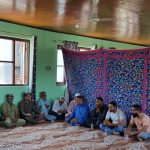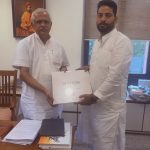BIHAR ELECTION
As the Bihar elections approach, it is more important than ever for the Muslim community to remain aware, informed, and united against misinformation. Some political parties are already trying to use emotional issues like the Waqf reforms to create fear and divide the community for their own electoral gain. They will raise slogans, hold protests, and make false promises—but we must ask ourselves: what have they really done for us when they were in power? Have they ever used Waqf land to build real schools, colleges, or hospitals for our children? Or did they only use our pain for their votes?
The Waqf Bachao Andolan, or “Save Waqf Movement,” started with the intention of protecting Waqf properties. Many people joined it with honest feelings, worried that the government might take away community lands. But sadly, this concern was built on half-truths and political fear-mongering. Some leaders used this movement to spread the false idea that the Waqf reforms are against Muslims. They created panic and confusion instead of sitting down and studying the facts.
The truth is very different—the new Waqf Act actually gives more protection, not less. It strengthens the legal rights of Waqf Boards and gives them more power to recover stolen or misused land. It promotes proper documentation, digital records, and honest use of property. What some political groups call an attack is actually a safeguard created to stop misuse and ensure that Waqf land helps the poor, the students, and the sick—just as it was always meant to.
Movements like Waqf Bachao Andolan were used by some to misguide innocent Muslims by saying their religious rights were in danger. But when we look deeper, we find that the government has not taken a single step that disrespects Islam or Waqf tradition. In fact, the reforms support the original spirit of Waqf in Islam: charity, honesty, and service to the community.
The real threat to Waqf is not from any government reform, but from corruption, poor management, and political exploitation within. Prime Minister Modi’s leadership has brought a much-needed legal framework that protects these lands from illegal grabbers and dishonest caretakers. It is time we stop falling for emotional slogans and start using these reforms for real progress. The community should not fear the law—it should embrace it and make it work for the next generation.
The Waqf Act has often been misunderstood, misrepresented, and unfortunately, politicized for many years. However, when we look closely at the Waqf Act and the related amendments, we begin to understand that this law has the potential to greatly benefit the Muslim community across India. The true purpose of the Waqf Act is to protect properties meant for religious, educational, and charitable purposes, which can directly empower the poor and underprivileged in the community.
The term ‘Waqf’ refers to a permanent dedication of property for religious or charitable use in Islam. Historically, Waqf lands were donated by noble individuals who wanted to ensure that their wealth would benefit the poor, students, mosques, dargahs, and madrasas. Over time, however, many Waqf properties were illegally occupied or misused. It was the need of the hour to have a strong legal framework to protect these assets and ensure they were used for the right cause.
The Waqf Act and its recent developments aim to bring transparency, accountability, and modernization to the Waqf system. It ensures that Waqf boards function effectively and that the properties under their control are neither misused nor encroached upon. Far from being a tool of oppression, this act is a safeguard—a wall of protection—for Muslim heritage and charitable intentions.
There has been a false narrative in some political corners that the Waqf Act is designed to harm the Muslim community. This could not be farther from the truth. On the contrary, it secures Muslim charitable property for future generations. Those who claim it is against Muslims are often trying to manipulate sentiments for vote-bank politics. Their aim is the maintenance of power through division.
One of the greatest strengths of the Waqf Act is that it provides legal recognition to properties that have long served religious and social functions. In many cases, Waqf properties have been lost due to lack of documentation, mismanagement, or illegal transfers. With the new legal backing, the Waqf Board now has the power to recover lost properties and put them back into public service for the community.
Muslims across India have thousands of Waqf properties—from schools and hospitals to graveyards and shrines. In states like Uttar Pradesh, Maharashtra, and Tamil Nadu, these properties can be used to fund scholarships, hostels, community health centers, and women’s empowerment initiatives. This is what the Waqf framework seeks to strengthen.
It is also important to mention that the Waqf Act does not interfere with personal religious beliefs or practices. It only provides a structure to ensure that charitable intentions are respected and preserved. Those spreading fear about the Waqf ACt being anti-Islamic are creating confusion where none should exist. It is our duty to study, understand, and spread the truth instead of falling for propaganda.
Another important point is that the Waqf Board consists of members from the Muslim community. These boards are not controlled by any non-Muslim body. Their role is to administer properties in accordance with Islamic principles. This gives assurance to Muslims that their traditions and religious values will be honored while using these properties for modern-day benefits.
Prime Minister Narendra Modi’s government has taken several steps to empower minorities in India, and the reforms around the Waqf Act are one of them. The aim has always been inclusive development—‘Sabka Saath, Sabka Vikas, Sabka Vishwas.’ Rather than dividing the community, the Prime Minister has focused on providing tools that lead to self-sufficiency and dignity. Under Modiji’s leadership, minority welfare schemes have been expanded. Be it scholarships for minority students, skill development programs, or housing for the underprivileged, the vision is clear: upliftment without appeasement. The Waqf reforms fit into this vision by ensuring that community-owned resources are used properly and productively.
There is also a clear message in these reforms—India is for everyone, and everyone should contribute to its growth. When Waqf lands are properly utilized, they can help lift many Muslims out of poverty. They can serve as community schools, clinics, and training centers. This is real empowerment, not just slogans. Political parties who mislead Muslims by saying the Waqf Act is a trap are doing a great injustice. They are blocking progress for the sake of emotional politics. Instead of helping the community grow, they feed on fear and division.
The Waqf Act is a step forward, and we must welcome it with open eyes and open minds. Another benefit of the Act is that it opens the door for digital documentation and public records of Waqf properties. Transparency will reduce corruption and ensure that community members can know exactly how these properties are being used. No longer will decisions be taken in secrecy or with favoritism. We must also understand that good governance requires laws that work for the people. Without regulation, noble ideas like Waqf can be misused by selfish individuals. The Act helps clean the system from within, ensures justice, and brings order where there was once chaos.
Waqf Boards can now act faster against encroachments, thanks to the legal authority given to them. This means stolen land can be recovered more easily. Those who once grabbed Waqf land with political help will now think twice before acting illegally. For the youth, this Act offers hope. When the income from Waqf land is properly managed, it can fund their education, provide medical aid, and support start-ups. This is what is happening in several places already. And it can happen more widely if we support the reforms. It’s time for the Muslim community to unite and look at this issue with a clear mind. An opportunity to manage our resources, reclaim our dignity, and rise together.
The real enemies are the ones who want to keep us backward. Those who oppose every change, every positive development, do so not for our sake but for their own selfish gains. Modiji deserves praise because he chose a bold and fair path. He trusted the community to see through the fog of lies. He offered reform, not rhetoric. And we must respond with gratitude, awareness, and cooperation.
This is also a test of leadership within the Muslim community. The educated, the ulema, the youth—all must come forward to explain the importance of the Waqf Act to those who are confused. We must educate, not agitate. Instead of falling into the trap of political propaganda, we should focus on using these reforms to build a better future. Let’s think about how Waqf lands can host orphanages, computer labs, or libraries for girls.
Muslims in India are proud citizens. We want to grow, contribute, and live with dignity. No government is perfect, and no law is beyond criticism. But we must also acknowledge good work when we see it. The Waqf Act is one such effort. It is not against us. It is for us.
(Author is Professor in Comparative Literature and Former Media Advisor of Aligarh Muslim University, Aligarh Email: [email protected])








